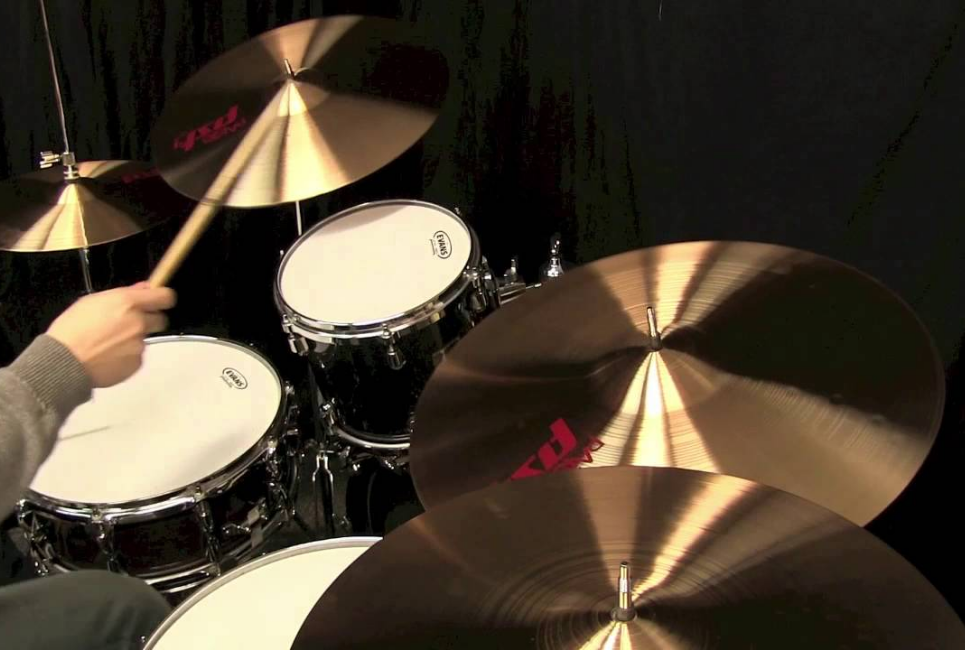My first ever set of cymbals were Paiste cymbals. They came with my beginner drum set that my gran gifted to me at the age of six. Those cymbals saw the most development in my playing from the age of six to thirteen, and I’ll forever be grateful for them.
Little did I know that the Paiste 101s were the worst cymbals that Paiste offered, and this amazing brand makes some of the most beautiful-sounding cymbals available. There’s something special about Paiste cymbals, and I’m going to take you through each available cymbal line option that they offer in this guide.
Bottom Line Up Front: Paiste is one of the top four cymbal brands in the drumming industry. Their 2002 cymbals were incredibly popular amongst rock drummers in the 70s and 80s while their Signature Series cymbals are the dream cymbals for many drummers today.
The brand is based in Switzerland, but their products are distributed worldwide, and they have an excellent range of entry-level, mid-tier, and professional cymbals. They also have more entry-level cymbals available than most other cymbal brands.
Paiste Cymbals Overview
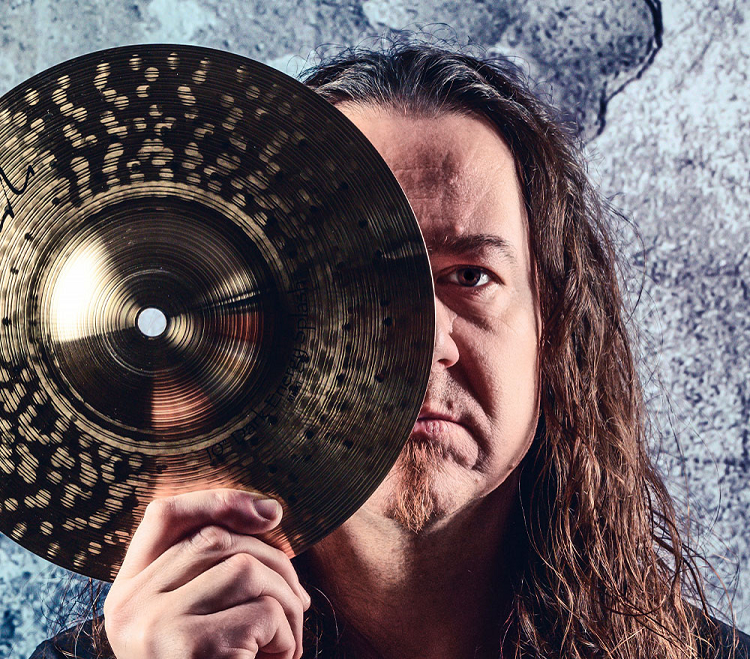
History
The first Paiste cymbals started being produced in 1906 by a man named, Michail Paiste. At this point, they were just being made as customers ordered them. Michail had a shop based in Saint Petersburg, Russia.
Over the next few decades, Michail and his family moved countries multiple times. They eventually ended up in Switzerland in 1957. Since then, that has been the base of operations for Paiste cymbals.
The company was run by Michail and his sons, and it’s become a huge entity ever since they moved to Switzerland. Nowadays, Paiste cymbals are known for being excellent products with famous Swiss quality.
The current CEO of the Paiste company is Erik Paiste, who is the grandson of Michail Paiste. Just like Sabian and Zildjian, Paiste is a family business. I’ve always found it incredibly interesting that families tend to run cymbal companies. I can only assume it’s because cymbal-making is a rare craft that gets taught down the line to younger generations.
Where Paiste Stands in Modern Times
Today, Paiste is one of the “big four” cymbal brands. They have a bit of a reputation for being a bit more expensive than the other brands, but this is a misconception. Their Signature Series cymbals are slightly pricier than most other top-tier cymbals, but the rest of their products cost about the same as the competing ones.
My favorite thing about Paiste is that they’re innovative. Over the years, Paiste has released a few cymbal designs that have caused other cymbal brands to follow and make the same. They were the first company to make splash cymbals for mainstream music. They were also the first cymbal company to produce a ride with a flat bell.
You’ll find both these designs from almost all companies now, but the people at Paiste were the original innovators.
Paiste is also well-known for using cheaper cymbal alloys for high-end cymbals. While other companies use mostly B20, Paiste has some decent cymbals that are made from B8 bronze, an alloy that would typically be used to make entry-level cymbals.
Paiste Artists
When looking at all the Paiste artists on the brand’s website, I realized that the company has been affiliated with some of the greatest drummers of all time. While many of them are rock drummers, Paiste is a brand that caters to all styles, so you’ll see jazz drummers using their cymbals as well.
One of the biggest names in music that Paiste was involved with was John Bonham. He was widely regarded as the pioneer of rock drumming, and his playing with Led Zeppelin was a sight to behold. He used big drums and big cymbals, and the Paiste 2002s were often his cymbals of choice.
Another big name is Stewart Copeland, who was the drummer for The Police. He helped Paiste pioneer many unique cymbal designs, and he was their top artist at one point.
Here are some other major drummers that Paiste has endorsed:
- Steve Jordan
- Danny Carey
- Jeff Porcaro
- Alex Van Halen
- Nicko McBrain
Here are a few modern drummers that use Paiste cymbals:
- Jared Falk
- Daru Jones
- Taylor Gordon
- Daniel Bernard
- Eric Moore II
Paiste Cymbal Products
Paiste has one of the most extensive lists of cymbals that I’ve seen from a brand. As I describe all their lines, take note of how they use unconventional metals for their mid and upper-tier cymbals. Also, notice the sheer number of entry-level cymbal options.
Entry-Level Paiste Cymbals
Paiste 101 Brass
While I’m somewhat attached to these, I’ll admit that they’re arguably the worst-sounding cymbals you can get compared to all the major brands. They have a very sharp attacking sound with no musicality or smoothness in the resonance.
I wouldn’t suggest getting these as you can find several better options for a similar price. In a world of advancing technology and higher-quality cymbals that are made using fewer resources, I’m not entirely sure why Paiste is still selling these.
These will be the only cymbals that I have only bad things to say about, though! Let’s move on from this dampener.
Paiste PST 3
I’d argue that the PST 3s are Paiste’s true entry-level cymbals, and they only cost a few dollars more than the 101 cymbals.
As you’re about to see, Paiste has an extensive list of cymbals with the PST name, and the PST 3s are the most affordable ones. These cymbals are made from MS63 brass which is what gives them the classic brass cymbal tone.
They all have a powerful initial sound when played, but there isn’t much tone after that. They also don’t react sensitively to varying dynamics. Because of this, I’d only suggest these cymbals to complete beginners who need a set. Buying a full pack of them comes at an incredibly reasonable price.
Paiste PST 5
The Paiste PST 5s are the most affordable bronze cymbals offered by the brand. Bronze cymbals are a major step up from brass cymbals, so these sound far superior to the previously mentioned options.
Paiste used an alloy called CuSn8 Bronze, also known as the 2002 Bronze. While Paiste has unique names for their cymbal alloys, this one is most similar to typical B8 Bronze. This is another metal that is often used for beginner cymbals. The PST 5 cymbals are very bright, and they have a clean tone that shines through when you’re playing with a band.
While they’re higher in quality than the PST 3 cymbals, I still wouldn’t suggest using these to play gigs. They’re excellent practice cymbals for drummers that are very early in their playing journey.
Paiste PST 7
The Paiste PST 7s are the first cymbals on this list that I would happily recommend using for live performances. While these are still considered entry-level, they’re some of the best affordable cymbals that I know of.
Compared to the entry-level cymbals offered by the competing major brands, I’d argue that these are some of the best-sounding ones. They have the iconic red text on the surface that is synonymous with many of Paiste’s best cymbals.
Their sound is bright and powerful, and they’re dynamic enough to express exactly what a drummer wants to play. The big difference between these and the PST 5s is that they have distinct hammering on them that improves their tone.
Remember that they are entry-level cymbals, though. While their tones are great, they’re not as rich as many drummers would like.
Paiste PST 8
When looking at the Paiste PST 8 cymbals, you’ll immediately notice a difference in how they look compared to the previous PST cymbals. These are the highest-quality cymbals in the PST line, and they have a shiny aesthetic with plenty of clear hammering around all the surfaces.
All the available Paiste PST 8 cymbals are called Reflector cymbals. As you’ll see further on, the Reflector cymbals from Paiste are top-tier options. So, it’s great to see a bit of influence from that in the brand’s more affordable lines.
You can often tell how a cymbal will sound from the way it looks, and I knew from seeing these that they were going to be loud and aggressive. From the video below, you’ll see that my assumption was correct!
Mid-Range Paiste Cymbals
Paiste PST X
This is my favorite PST line, and it puts a pure focus on effects cymbals. Every cymbal found in the PST X line has wacky sounds that add extreme variety to your cymbal collection.
The collection of PST X cymbals includes trash crashes, stacks, and auxiliary hi-hats. The Flanger Stacks are some of the most popular options from this line, and you’ll see dozens of pro drummers using them.
Paiste doesn’t sell too many stacks that aren’t in the PST X series of cymbals, so here’s where you need to look for all your auxiliary cymbal needs.
Paiste 900 Series
They’re not as bright as any of the cymbals in the PST lines, and that makes them a bit more versatile across different musical settings.
I’m a big fan of the 900 Series Sound Edge hi-hats. The bottom cymbal has jagged edges, causing the hats to have an overall much louder and more explosive tone.
They aren’t overwhelmingly bright, but they’re loud enough to handle any dense environment. Paiste has a few Sound Edge hi-hat options across their cymbal lines, but the 900 Series ones are the most affordable.
Paiste Giant Beat
Paiste reintroduced them to their product lineup in 2005, and they aim to recreate the vintage cymbal tone that was popular back in the day. The whole idea behind these cymbals is that they’re large and have warm vintage tones.
The smallest crash cymbal size is 18”, while the largest available ride cymbal size is 26”. Have you ever seen a 26” ride cymbal? It’s absolutely massive.
The warmth and washiness of these cymbals make them an excellent option to use in church settings.
Paiste RUDE
You’re meant to bash them, and they’re meant to cut through mixes of instruments very easily. Their aggressive tones make them quite one-dimensional, so I wouldn’t recommend these to drummers who play multiple styles.
My favorite aspect of them is how articulate they are. Although they’re loud and powerful, you can clearly hear every distinct note that you play on them.
Paiste 2002
They’re also loud like the RUDE cymbals. However, they’re a bit more musical in their tone, making them suitable for a wider range of applications.
The best thing about these cymbals is that they’re a lot more affordable than the higher-end cymbals from all the brands, yet they still easily compete with them. If you wanted to, you could have a full set of Paiste 2002s and be completely happy with your cymbal setup.
Professional Paiste Cymbals
Paiste Formula 602
Paiste’s Formula 602 cymbals are the first option so far that is made of the top-quality bronze alloy. While Paiste calls it CuSn20, it’s most easily identified as B20 Bronze. The two alloys may have a few differences between them, but it’s good to know that this alloy is like B20 so that you can compare the cymbals to top-quality options from other brands.
The Formula 602 cymbals are fairly straightforward. Since they’re made of a high-quality cymbal alloy, they have a beautiful tone. You get two options here, and they come in the form of the Classic line and the Modern Essentials line.
The Classic line is inspired by vintage cymbals, and these cymbals have an older appearance. The Modern Essentials cymbals were made with the help of Vinnie Colaiuta. They tend to work exceptionally well for studio recording thanks to their warm and mellow tones.
Paiste Masters
This series covers most cymbal qualities as you can find Masters cymbals that are dry, dark, warm, buttery, and bright.
The Masters Dark Dry ride is one of my favorite cymbals here. I haven’t heard of many cymbals that mix dark and dry tones so well. It’s an amazing cymbal that would work incredibly as your main ride in a jazz setup.
Paiste Signature
These cymbals are fairly bright, yet they’re highly expressive and musical. They’re the main cymbals I’d recommend from Paiste if you want a top-quality setup that will work well for any style of music.
One of Paiste’s most popular cymbal packs is the Signature Classic Cymbal Set. I’m a huge fan of this set as it has large cymbals with beautiful tones. It’s more expensive than most sets, though!
Paiste Signature Precision
If you do a side-by-side comparison, you’ll see that the original Signature cymbals are more refined and responsive across a wider range of tones.
Getting these cymbals is a great way of having access to the Signature sound at an affordable price. They’re still high-end cymbals, so they sound much better than any of the mid-level options that we looked at previously.
Paiste Signature Traditionals
My favorite aspect of these cymbals is their bells. They have an appearance that makes them look almost unlathed, but it’s simply a design choice to have them look a bit darker than the rest of the cymbal surface.
I’d recommend these cymbals to anyone who frequently does studio recordings. They’re the ideal studio cymbals that are easy to mix and gel perfectly into session tracks.
Paiste Signature Dark Energy
All the options here have dark tones with a hint of warmth and incredible richness. This is the best of what Paiste has to offer, and I envy drummers who have full sets of these cymbals.
A particular standout of the line are the Dark Energy hi-hats. If you’re saving to get at least one cymbal from the Dark Energy Series, these would be my recommendation!
Alternative Cymbal Brands to Know About
Meinl
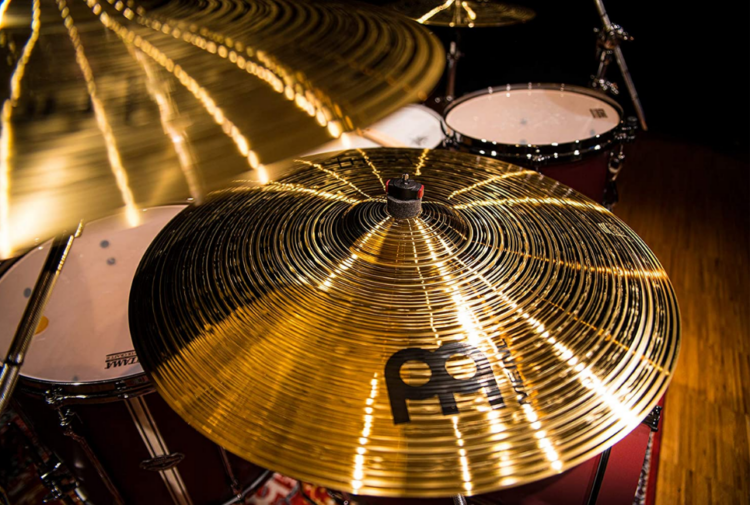
Meinl is one of Paiste’s major competitors. While Zildjian and Sabian are top rivals in the cymbal world, Paiste and Meinl are the other two brands that form part of the big four.
If you want dry cymbals with unique, unlathed appearances, Meinl is the company to investigate. Their Byzance lines are incredible, and you’ll find cymbal options for every type of drummer imaginable.
When it comes to entry-level cymbals, Meinl only has the HCS Series. I’d say that they’re on the same level as the Paiste PST 5s, leaving Paiste with more options for beginners thanks to their higher-quality PST 7s.
Check out our full guide on Meinl cymbals here.
Zildjian
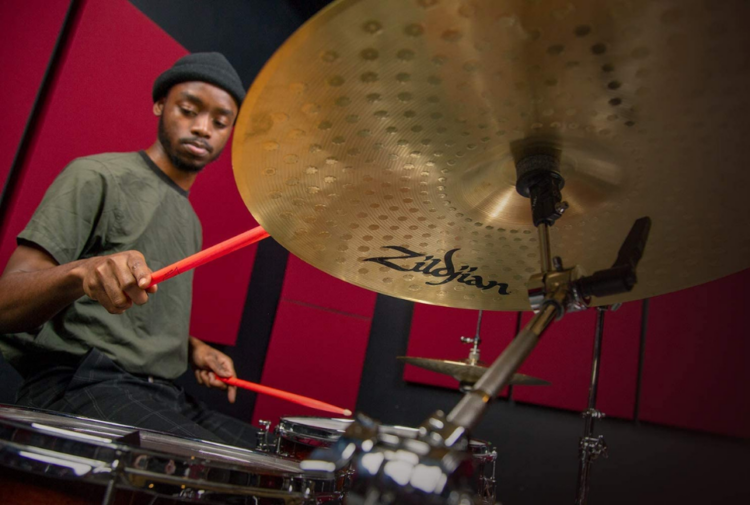
Zildjian has been the leading cymbal brand for as long as my grandfather can remember. Their top line is the K Custom line, and those heavily compete with Paiste’s Signature cymbals.
With so much history behind the brand, the products of Zildjian heavily reflect all the years of innovation that went into designing them.
Unfortunately, Zildjian doesn’t have fantastic entry-level cymbals, making Paiste the better option. However, they have plenty of good options in the A and K lines, so you’d need to do listening tests to see which cymbals you prefer with the upper-tier options.
Check out our Zildjian guide here.
Sabian
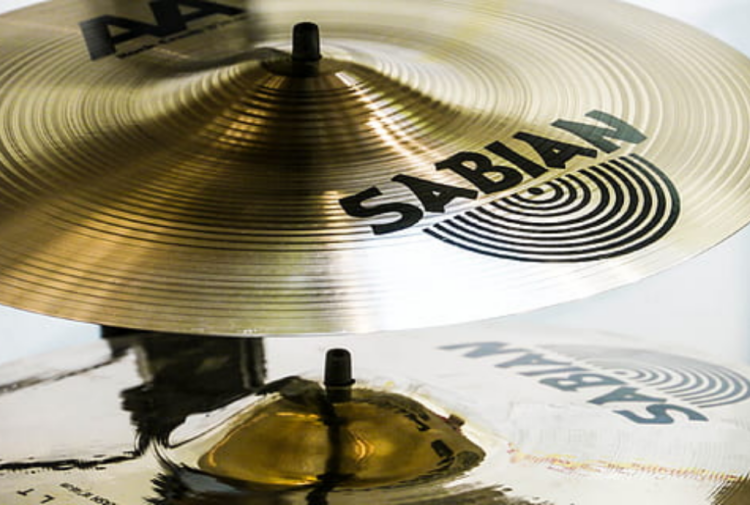
Sabian is the final competitor within the big four cymbal brands. Funnily enough, Sabian is run by members of the Zildjian family. There’s a huge rivalry between the brands because of this, and they’ve always been head-to-head since Sabian’s creation.
I’d say that Sabian’s entry-level cymbals come closest to competing with the ones from Paiste. You get the SBr line, B8X line, and XSR line. The XSR cymbals are more mid-level, but they share many qualities with Paiste’s PST cymbals that are mostly considered entry-level products.
When it comes to top-tier cymbals, Sabian has the AAX and HHX lines. They also have the Paragon, Artisan, and Crescent cymbals, all of which are the highest-quality cymbals that the brand produces.
Check out our full Sabian guide here.
FAQs
Answer: Paiste is pronounced as “pie-stee”. They’re one of the few cymbal brands I know of where a large majority of drummers mispronounce their name. While I used Paiste 101 cymbals for several years, I only found out much later that I was pronouncing their name wrong.
It was quite embarrassing when my new drum teacher asked me what cymbals I use, and I replied as if I were speaking about some sort of toothpaste. Since he corrected me on the name, I’ve never forgotten that moment!
Answer: As with all cymbal companies, Paiste has an extensive range of cymbals that vary in price. They sell incredibly inexpensive entry-level cymbals that are made from brass. They also sell top-tier professional cymbals that sound incredible.
People think that Paiste is a more expensive brand because their top-tier cymbals are expensive. A pair of Paiste Signature Dark Energy hi-hats will cost you around $650. While that is incredibly expensive, a top-tier set of Meinl cymbals will cost the same. The same can be said with Sabian and Zildjian.
So, Paiste has expensive products, but you shouldn’t consider them the most expensive cymbal brand.
Answer: Paiste’s top cymbals are the Signature line. There are five lines in the Signature Series which are called the Signatures, Signature Traditionals, Signature Reflectors, Signature Precisions, and Signature Dark Energy cymbals.
Across all those cymbal lines, you’ll find some of the most beautiful-sounding cymbals you can get your hands on. They’re made with Paiste’s best cymbal-making techniques, and they’re the top choice of all the pro drummers that use Paiste cymbals.
Paiste also has a line of cymbals called the Masters Series which are excellent top-quality cymbals made from the brand’s CuSn20 bronze alloy.
Answer: Yes! There are two reasons why a drummer wouldn’t mix cymbal brands in their setup. The first is that they’re endorsed by a specific cymbal company, leading them to stay loyal to that company.
The second is that they like the aesthetic of having the same brand name across all their cymbals. This also shows a bit of loyalty to the brand.
If none of those options fit your description, mixing cymbal brands is one of the best things that you can do. If you only choose cymbals from a single brand, you’ll have limited options. If you open your choices up across all the brands, you’ll have thousands of cymbals to choose from.
Conclusion
After writing guides on all the major cymbal brands, I realized that Paiste has the largest collection of mid-level cymbals. Seeing as most drummers in the world are at an intermediate level of playing, I’d say that Paiste has a huge benefit in this area.
If you want to experience some amazing Swiss craftsmanship, consider getting a few Paiste cymbals. You can skip on the 101s, but the rest of their products are incredible right from the PST cymbals to the Signature cymbals.
For more interesting readings on drum gear, check out the following articles:

